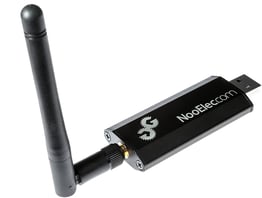10 Popular Software Defined Radios (SDRs) of 2022
%20-%20Graphic%20New.png?width=885&name=10%20Popular%20Software%20Defined%20Radios%20(SDR)%20-%20Graphic%20New.png)
Back in 2016, we wrote one of our most popular posts covering 12 popular Software Defined Radios or SDRs. While the previous post still holds some extremely valuable information, a lot has changed… especially the technology related to SDR. So we thought it was time for an update.
Like last time, we tried to include as much diversity in terms of prices, applications, frequencies, and ease of use. Our hope is the perfect software defined radio for your application is on this list.
Without further ado, here are 10 great Software Defined Radios available to take your electronic designs further!
**Disclosure: This post contains affiliate links at no additional cost to you.
**Product Images and descriptions from product websites
10 Top Rated Software Defined Radios (SDR)
HackRF One from Great Scott Gadgets is a Software Defined Radio peripheral capable of transmission or reception of radio signals from 1 MHz to 6 GHz. Designed to enable the test and development of modern and next-generation radio technologies, HackRF One is an open source hardware platform that can be used as a USB peripheral or programmed for stand-alone operation.
● 1 MHz to 6 GHz operating frequency
● half-duplex SDR transceiver
● up to 20 million samples per second
● 8-bit quadrature samples (8-bit I and 8-bit Q)
● compatible with GNU Radio, SDR#, and more
● software-configurable RX and TX gain and baseband filter
● software-controlled antenna port power (50 mA at 3.3 V)
● SMA female antenna connector
● SMA female clock input and output for synchronization
● convenient buttons for programming
● internal pin headers for expansion
● Hi-Speed USB 2.0
● USB-powered
● open source hardware
 The Ubertooth One is an open-source 2.4 GHz wireless development platform suitable for Bluetooth experimentation. One thing that sets the Ubertooth apart from other Bluetooth development platforms is that it’s capable of not only sending and receiving 2.4 GHz signals, but can also operate in monitor mode, monitoring Bluetooth traffic in real-time. This operating mode of the Ubertooth One has been present in low-cost WiFi modules for years and has found myriad uses in research, development, and security auditing but no such solution existed for the Bluetooth standard until now. Also, because it’s a fully open-source platform (software and hardware), the schematics and code are readily available for all of your hacking needs.
The Ubertooth One is an open-source 2.4 GHz wireless development platform suitable for Bluetooth experimentation. One thing that sets the Ubertooth apart from other Bluetooth development platforms is that it’s capable of not only sending and receiving 2.4 GHz signals, but can also operate in monitor mode, monitoring Bluetooth traffic in real-time. This operating mode of the Ubertooth One has been present in low-cost WiFi modules for years and has found myriad uses in research, development, and security auditing but no such solution existed for the Bluetooth standard until now. Also, because it’s a fully open-source platform (software and hardware), the schematics and code are readily available for all of your hacking needs.
YARD (Yet Another Radio Dongle) Stick One can transmit or receive digital wireless signals at frequencies below 1 GHz. It uses the same radio circuit as the popular IM-Me. The radio functions that are possible by customizing IM-Me firmware are now at your fingertips when you attach YARD Stick One to a computer via USB.
Capabilities:
● half-duplex transmit and receive
● official operating frequencies: 300-348 MHz, 391-464 MHz, and 782-928 MHz
● unofficial operating frequencies: 281-361 MHz, 378-481 MHz, and 749-962 MHz
● modulations: ASK, OOK, GFSK, 2-FSK, 4-FSK, MSK
● data rates up to 500 kbps
● Full-Speed USB 2.0
YARD Stick One comes with RfCat firmware installed, courtesy of atlas. RfCat allows you to control the wireless transceiver from an interactive Python shell or your own program running on your computer. YARD Stick One also has CC Bootloader installed, so you can upgrade RFCat or install your own firmware without any additional programming hardware. An antenna is not included. ANT500 is recommended as a starter antenna for YARD Stick One.
KiwiSDR is a software-defined radio (SDR) covering shortwave, the longwave & AM broadcast bands, various utility stations, and amateur radio transmissions, worldwide, in the spectrum from 10 kHz to 30 MHz. The KiwiSDR is a custom circuit board (cape) you connect to the BeagleBone GreenorBeagleBone Black computer. You simply add an antenna, power supply, and network connection. Software supplied on a micro-SD card.
An HTML5-capable browser and internet connection will let you listen to a public KiwiSDR anywhere in the world. Up to four people can listen simultaneously to one radio — each listener tunes independently.
Features:
● Browser-based interface four simultaneous user connections.
● Each connection tunes an independent receiver channel over the entire spectrum.
● Waterfall tunes independently of audio and includes zooming and panning.
● Multi-channel, parallel DDC design using bit-width optimized CIC filters.
● Good performance at VLF/LF since we personally spend time monitoring those frequencies.
● Automatic frequency calibration via received GPS timing.
● Extension interface for adding decoders and utilities.
The NESDR Mini 2+ is tuned for SDR usage, including a high-accuracy, Japanese fabricated, GPS-rated 0.5PPM TCXO crystal; re-designed RF-suitable power supply; and improved capacitors and inductors compared to generic devices. Power consumption has been reduced while improving sensitivity and lowering the noise floor.
A high-quality telescopic antenna and strong magnetic suction mount base is included free of charge in order to facilitate a wide variety of antenna mounting options. A free female SMA adapter is also included at no cost for those looking to connect SMA antennas to the NESDR Mini 2+.
The perfect device for learning software defined radio, on the cheap. Amateur radio, ADS-B, police & fire scanning, trunking, satellite images–you name it, this little guy can probably do it. Outperforms many devices 10x its cost!
Related Article: 10 Great Tablets With USB Ports for your SDRs
Brand new design! The NESDR Nano 2+ is custom-made by NooElec for SDR applications. The enclosure was also re-designed to assist in maintaining lower temperatures than the previous generation.
The tiny size and 24/7 capability make the Nano 2+ perfect for embedded applications! How small? Just 24mm x 21mm x 8mm (15/16″ x 13/16″ x 5/16″)!
The Nano 2+ contains a new custom TCXO fabricated exclusively for NooElec. Important TCXO specifications: Frequency stability: 0.5PPM (max) Phase noise @1kHz offset: -138dBc/Hz (or better) Phase noise @10kHz: -150dBc/Hz (or better) Phase noise @100kHz: -152dBc/Hz (or better) This is, by far, the highest performance TCXO available in any low-cost SDR.
Full compatibility with a wide variety of popular SDR software packages, such as Matlab, HDSDR, SDR Touch, Planeplotter, SDR#–too many to list, really. We’re talking Windows, Mac, Linux, Android, Raspberry Pi…you’d be hard-pressed to find somewhere you can’t use these!
This is an RTL-SDR software defined radio receiver with RTL2832U ADC chip, 1PPM TCXO, SMA F connector, R820T2 tuner and aluminum case with passive cooling. Tunes from 500 kHz to 1.7 GHz with up to 3.2 MHz (2.4 MHz stable) of instantaneous bandwidth. (HF mode works in direct sampling mode – V3 models and above only). Perfect for use as a computer-based radio scanner with free software like SDR#, HDSDR, SDR-Radio, Linrad, GQRX or SDR Touch on Android. Works on Windows, MacOS, Linux, Android, and even embedded Linux computers like the Raspberry Pi.
Great for many applications including general radio scanning, air traffic control, public safety radio, ADS-B aircraft radar, AIS boat radar, ACARS, trunked radio, P25/MotoTRBO digital voice, POCSAG, weather balloons, APRS, NOAA APT weather satellites, Meteor M2 satellites, radio astronomy, meteor scatter monitoring, DAB, or for use as a low-cost panadapter with a traditional ham radio.
This model has several improvements over other models. It uses the improved R820T2 tuner, comes with a 1PPM TCXO (no drift and accurate tuning with a 2 PPM initial offset and 1 PPM temperature drift), improved component tolerances, redesigned PCB, cooling improvements, extra ESD protection, and an SMA F connector. It also comes with a software activatable bias-tee circuit for powering external devices such as LNA’s and active antennas.
While not a stand-alone SDR, this one made our list anyways. The Ham It Up Upconverter works with the most common SDR platforms to create a HAM radio.
Ham/amateur radio enthusiasts, rejoice! Our MF/HF converter for software defined radio will allow you to listen to MF and HF through your existing software defined radio (SDR).
Improvements include increased sensitivity, ultra-low voltage noise floor, optional battery-powered operation, side-mounted LED indicators, fully-assembled broadband RF noise-source circuit, u.fl socket for optional external clock injection, surface-mount high-accuracy oscillator, and much, much more!
The NESDR Nano 3 USB OTG bundle includes everything you need to get started with mobile SDR with your existing USB On-The-Go compatible device! The NESDR Nano 3 is compatible with most host devices, including Windows, Mac OS X, Linux, Android and Raspberry Pi.
NESDR Nano 3 quick specs: tuning range 25MHz-1700MHz, tuning accuracy 0.5PPM, aluminum enclosure, MCX & SMA antenna input.
Included:
●
NESDR Nano 3 Software Defined Radio (RTL-SDR) installed inside an aluminum enclosure
●
Nano-sized antenna
●
Nano-sized USB OTG adapter
●
USB OTG Y-adapter
●
USB OTG cable
●
USB OTG Y-cable
●
Right-angle SMA female antenna adapter
●
SDR heatsink (optional)
NESDR Nano 3 Software Defined Radio (RTL-SDR) installed inside an aluminum enclosureNano-sized antennaNano-sized USB OTG adapterUSB OTG Y-adapterUSB OTG cableUSB OTG Y-cableRight-angle SMA female antenna adapterSDR heatsink (optional)
The included accessories allow for a wide variety of installation and configuration options. The included Y-cable and Y-adapter will allow for an auxiliary power source to be connected (USB charger or additional battery) to provide power to the SDR and prolong the battery life of your host phone or tablet. The nano-sized USB OTG adapter & antenna allows for the smallest possible installation footprint of any SDR available anywhere.
A full, wide-band RF solution for those interested in getting started with software defined radio and with a keen interest in HF bands.
The NESDR SMArt HF Bundle utilizes a well-designed upconverter–the Ham It Up–to receive HF, NOT direct sampling hacks. This results in a vastly different HF experience–much better performance, and no loss of gain controls.
Included is a Ham It Up v1.3 upconverter, installed in a custom black aluminum enclosure; an NESDR SMArt RTL-SDR, 3 antennas, an impedance matching balun for longwire and dipole antennas, and interconnect adapters.

Full Disclosure: Some of the links above are affiliate links, meaning, at no additional cost to you, we will earn a small commission in you click through and make a purchase.




















